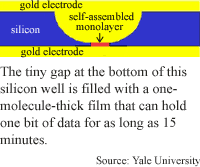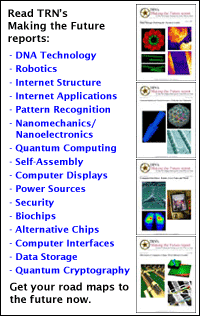
Molecules
make short-term memory
By
Eric Smalley,
Technology Research NewsShort of using quantum effects, the ultimate computer memory would store each bit in a single molecule. Memory devices made from one or even a relatively few molecules have the potential to hold hundreds of times more data than today's semiconductor memories.
There are two challenges to using molecules as memory: finding a molecular mechanism that can be reliably switched on and off, and making a device that can read and write to individual molecules.
While the second challenge is likely to remain unsolved for a long time, researchers are beginning to crack the first. Finding suitable molecular mechanisms could also yield useful devices short of full-blown molecular memory.
Researchers at Yale University and Rice University have developed a prototype that could lead to cheap, high density, nonvolatile memory. The device consists of a one-molecule-thick film, or monolayer, 30 to 50 nanometers in diameter that connects two metal electrical contacts.
A positive electric pulse changes the conductivity of the molecules from low to high, which constitutes writing one bit. A smaller positive pulse measures the conductivity of the molecules to read whether there is a bit but does not erase it. A negative pulse returns the molecules to their low conductivity state, erasing the bit.
"It has resettable conductivity states: on or off corresponds to different resistances, and the states are resettable reproducibly," said Mark A. Reed, a professor of engineering and applied science at Yale University.
The molecules don't remain in the high conductivity state for long, however. They hold the information for about 10 to 15 minutes, far shorter than magnetic nonvolatile memory, which theoretically holds data infinitely. "These self assembled monolayer devices have yet to be infinite, but 10 to 15 minutes might be of sufficient interest," said Reed.
The molecular mechanism requires no more than one molecule, which opens the possibility of eventually producing single-molecule memory devices. However, "this is very, very challenging and may not be the best application goal to chase," said Reed. "I don't envision single-molecule memory cells," he said.
But the device, which uses about 1,000 molecules, doesn't have to be scaled all the way down to one molecule to yield memory that is far cheaper and higher capacity than today's semiconductor devices.
"It strikes me as an impressive and important piece of work," said Mike Ward, a chemistry reader at the University of Bristol. "It is very easy to find molecules which undergo a change in response to a stimulus of some sort, but often the change reverses as soon as the stimulus is removed."
It's too soon to gauge how long it will take before practical applications for the molecular device can be developed, said Reed.
Reed's research colleagues were Jia Chen, now at IBM, and Adam M. Rawlett, David W. Price and James M. Tour of Rice University. They published the research in the June 4, 2001 issue of the journal Applied Physics Letters. The research was funded by the Defense Advanced Research Project Agency (DARPA) and the Semiconductor Research Corporation.
Timeline: Unknown
Funding: Government, Corporate
TRN Categories: Biological, Chemical, DNA and Molecular Computing
Story Type: News
Related Elements: Technical paper, "A Molecular Random Access Memory Cell," Applied Physics Letters, June 4, 2001
Advertisements:
June 27, 2001
Page One
Chemists concoct tiny lasers
Slimmer chips handle fast nets
Prototype transistors promise speedy chips
Molecules make short-term memory
Micromachine parts relax into place

News:
Research News Roundup
Research Watch blog
Features:
View from the High Ground Q&A
How It Works
RSS Feeds:
News
Ad links:
Buy an ad link
| Advertisements:
|
 |
Ad links: Clear History
Buy an ad link
|
TRN
Newswire and Headline Feeds for Web sites
|
© Copyright Technology Research News, LLC 2000-2006. All rights reserved.